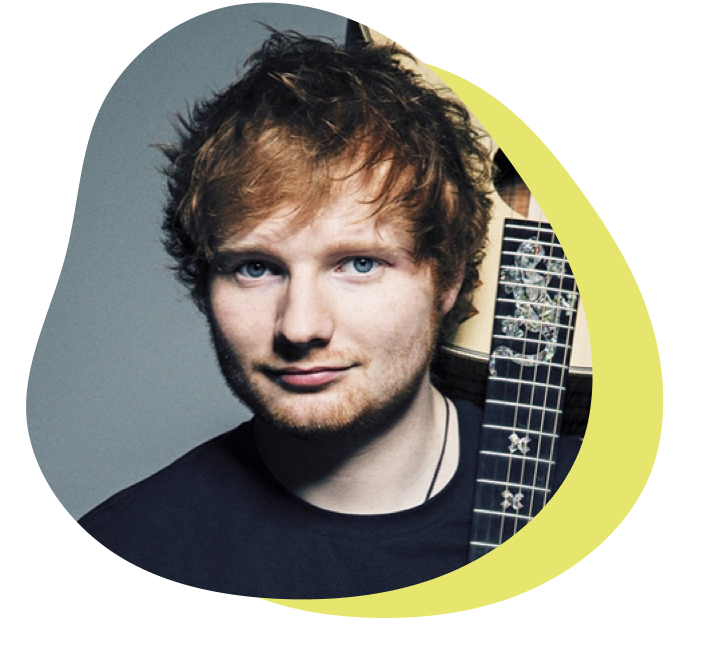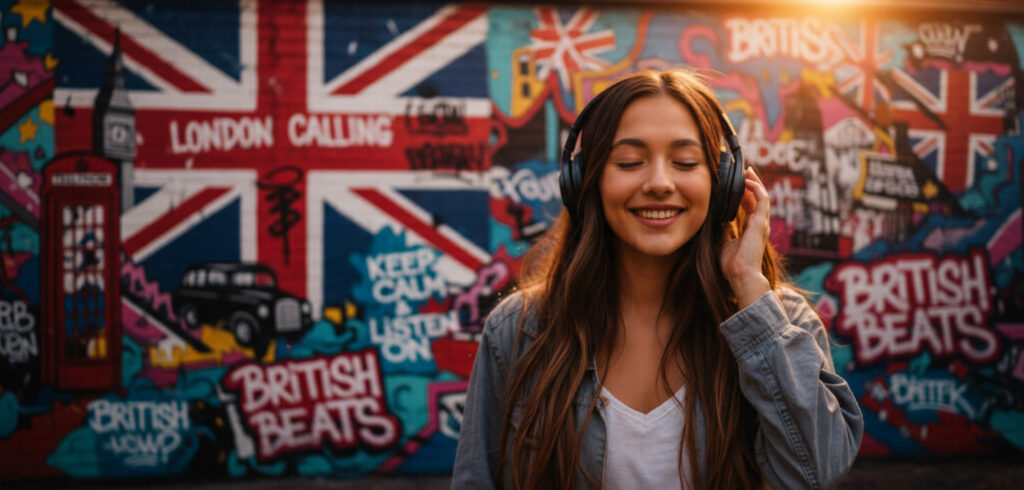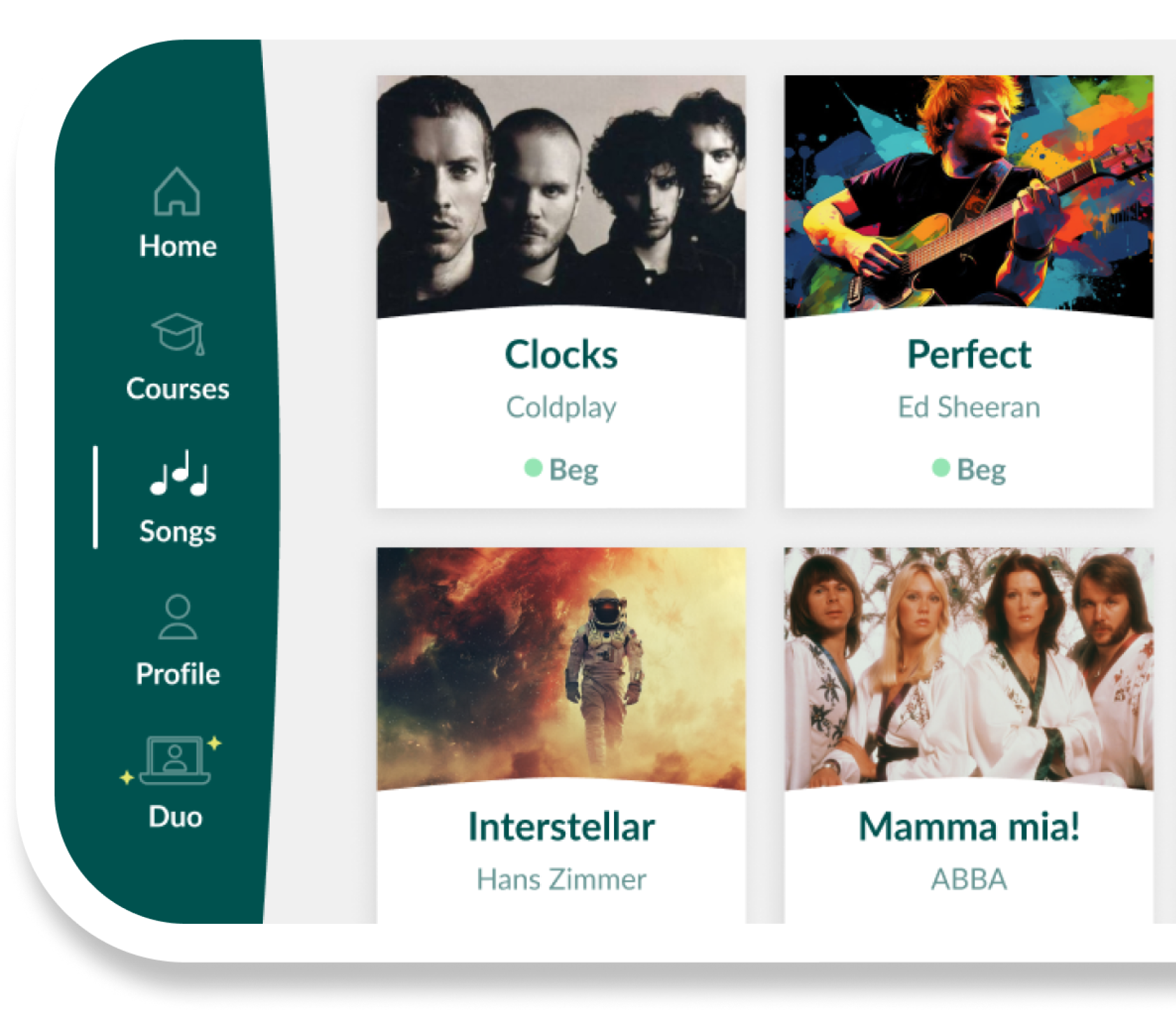From The Beatles to The Rolling Stones, Britain once challenged America’s musical supremacy. Today, the tables have turned: UK listeners stream American artists twice as much as their own. The data reveals Britain as one of the world’s most American-friendly music markets and one of the least supportive of its home-grown talent.
To better understand these dynamics, the piano learning app Skoove partnered with the analysts at DataPulse Research to break down more than a year of Spotify Top 200 data across 73 countries. The dataset includes over 800,000 data points, revealing how local music ecosystems thrive or decline in the age of algorithmic curation.
In the country that gave the world David Bowie, Amy Winehouse, and Arctic Monkeys, American artists dominate the charts like never before. Our year-long analysis of Spotify’s weekly Top 200 charts shows that American artists capture over half of the UK’s streaming presence, while British artists secure less than a third.
Our data paints a stark picture: Britain ranks 39th out of 73 countries in support for domestic artists, yet ranks 5th globally in its preference for American music. To put this in perspective, UK artists capture a smaller share of their home country’s charts than local artists do in Hungary, the Czech Republic, or even tiny Iceland. It’s a remarkable fall from grace for a nation whose musical exports once sparked a cultural revolution worldwide.
Europe's musical outlier: Standing alone in American embrace
When mapped against its European neighbours, the UK's musical choices appear even more striking. While continental Europe maintains strong allegiances to its local sounds, Britain has become an island of American cultural influence:
Nearly every major European country gives more chart presence to their domestic artists than the UK. With just 28% for local artists, Spain comes closest to Britain's low levels. However, unlike Britain, Spain imports most of its music from Puerto Rico (30%) rather than from the U.S. (7.5%). Meanwhile, musical powerhouses like Sweden — home to ABBA and modern pop architect Max Martin — maintain a majority share for their domestic artists despite massive international success.
The challenge of the common tongue
Britain's linguistic advantage has become its cultural Achilles' heel. While French audiences naturally gravitate towards French-language music and Italian listeners embrace their home-grown stars, British audiences face no language barriers when choosing between Stormzy and Kendrick Lamar, Ed Sheeran and Post Malone.
British artists must compete not just locally but against the full arsenal of American pop culture, from TikTok algorithms favouring U.S. hits to the nonstop flood of U.S. releases. In non-English-speaking countries, language can act as a natural buffer for local talent. In the UK, that protection doesn't exist. Scholars like Robert Phillipson have long argued that the dominance of English reinforces cultural hierarchies — a dynamic clearly reflected in Britain's charts. This contrasts starkly with countries like Italy, where local hip-hop has successfully adapted global genres while maintaining 83% domestic chart dominance.
Of course, some artists from non-English-speaking countries record in English, too. Still, the lack of a language barrier, combined with the sheer global reach of the American music industry, gives U.S. acts a natural advantage in English-speaking markets like the UK.
The result? A market where American megastars like Billie Eilish, Taylor Swift, and Sabrina Carpenter command British attention as easily as they do American. Our language correlation analysis reveals this pattern globally: countries with fewer speakers of their language typically show much stronger support for local artists.
Beyond the Atlantic: Britain's global musical palate
While U.S. chart control tells the headline story, the UK's streaming data reveals a surprisingly cosmopolitan musical diet that reflects its global connections:
The Commonwealth echo
- Canada (3.4%): Drake's Toronto sound and The Weeknd's dark pop resonate strongly with British audiences
- Ireland (3.1%): The closest European cultural cousin, from Hozier's folk-rock to traditional Celtic connections
- Australia (2.2%): Rising stars like The Kid LAROI tap into shared cultural DNA
Beyond the Anglosphere
Beyond the English-speaking world, a handful of other countries still manage to cut through and reach UK listeners:
- Brazil (1.1%): Latin rhythms break language barriers, led by artists like Anitta and funk carioca beats
- Germany (1.0%): Electronic and pop crossovers finding UK audiences
- South Korea (0.9%): K-pop's cultural wave reaches British shores through BTS, BLACKPINK, and Stray Kids
These seemingly small percentages represent millions of streams and position the UK as one of Europe's most globally receptive music markets: a double-edged sword that enriches cultural diversity while diluting local support.
The artists shaping British ears
Walk into any British coffee shop, gym, or shopping centre, and you'll hear the soundtrack of American cultural reach. Our analysis reveals a stark reality: British artists struggle to crack their own top 10.
American artists consistently occupy the most prominent positions on UK streaming charts. Artists like Sabrina Carpenter, Taylor Swift, Billie Eilish, and Drake regularly appear at the top of the UK's most-streamed lists, reflecting the country's strong preference for U.S. music that represents 55% of all chart positions.
The reality: UK artists face stiff competition from American acts even in their home market, contributing to the country's 39th-place ranking in global domestic music support.
UK's Music Landscape: Local Heroes vs Global Stars
The 30 artists who dominated UK's streaming in 2024-2025, ranked by their share of Spotify's Top 200 charts
UK Artists
International Artists
Sabrina Carpenter (U.S.)
3.9%
Chappell Roan (U.S.)
2.8%
Billie Eilish (U.S.)
2.7%
Kendrick Lamar (U.S.)
2.0%
Coldplay
2.0%
Taylor Swift (U.S.)
1.7%
Benson Boone (U.S.)
1.6%
Teddy Swims (U.S.)
1.6%
Gracie Abrams (U.S.)
1.6%
SZA (U.S.)
1.3%
Arctic Monkeys
1.3%
Charli xcx
1.3%
Bruno Mars (U.S.)
1.3%
Tate McRae (CA)
1.3%
Fleetwood Mac
1.2%
The British music industry's two faces
Export powerhouse, import nation
Britain operates as one of the world's largest music exporters, generating billions in revenue from artists who attain global success. Our data confirms this reach: British artists appear in the Top 5 music sources for 42 out of 73 countries analysed, with particularly strong presence in Ireland (24%), New Zealand (16%), and Australia (15%). Yet at home, this same market shows remarkable openness to international content, creating a unique dynamic where Britain both feeds and consumes the global music ecosystem.
The algorithm's invisible hand
Streaming platforms' recommendation systems may be inadvertently accelerating this transatlantic takeover. When algorithms can't distinguish between languages, they default to popularity metrics that favour established American stars with massive global followings. For emerging British artists, breaking through becomes an uphill battle against invisible technological bias. Our analysis of algorithmic influence reveals how these feedback loops amplify existing dominance patterns, reinforcing the global reach of already-successful acts while limiting exposure for home-grown talent.
UK cities in European context
When compared to major European cities, UK urban centres show remarkably low support for domestic artists. While Paris dedicates 62% of its streaming to French artists and even fragmented Germany sees cities like Stuttgart reaching 51% for German music, UK cities cluster at the bottom of the European scale:
The data reveals a striking pattern: all four UK cities rank in the bottom third of European cities for local artist support, with Manchester's 27% being the UK's highest, still trailing every single German and French city measured. Meanwhile, American artists capture 61-67% across all UK cities, a dominance unmatched elsewhere in Europe.
A reality check for British music
American music has secured dominance across UK listening charts in the battle for British hearts and minds. A country that once led the most successful cultural challenge to U.S. hegemony has become one of its most loyal international audiences.
The so-called British Invasion of the 1960s succeeded not by mimicking American music but by offering something unmistakably British that the world hadn't heard before.
If local artists can't even top the charts in the country they come from, what does that mean for Britain's next musical revolution?

"The game has completely changed. It used to be about building a following, town by town, with your sound echoing in local clubs. Now, the echo chamber is a global playlist. You're not trying to win over a city anymore; you're trying to please an algorithm. It's a fantastic way to reach the entire world, but you have to wonder what unique sounds get lost in that global translation."
Methodology
The study analysed data from the top 200 songs streamed weekly on Spotify across all 73 countries where Spotify publishes Top 200 charts. The data covers every week from May 23, 2024, to July 10, 2025.
We analysed chart performance using a points system: The No. 1 song received 200 points, No. 2 received 199 points, and so on. This allows us to weight chart position appropriately: a #1 hit counts more than a #200 track. The percentages shown throughout this report represent each country's or artist's share of total points, effectively measuring their share of Top 200 streaming activity weighted by chart position.
For songs with multiple artists, every artist on the track received the full points for that rank. For example, if a number one song featured three artists, each of those three artists was awarded 200 points.
Artists were analysed by their country of origin, not the location of their record label, agents, or other business affiliations.
For complete details on our data collection and analysis methods, read the full methodology here.
Study by: Skoove & DataPulse Research
Edited by: Susana Pérez Posada

With over seven years of piano education and a deep passion for music therapy, Susana brings a unique blend of expertise to Skoove. A graduate in Music Therapy from SRH Hochschule Heidelberg and an experienced classical pianist from Universidad EAFIT, she infuses her teaching with a holistic approach that transcends traditional piano lessons. Susana's writings for Skoove combine her rich musical knowledge with engaging storytelling, enriching the learning experience for pianists of all levels. Away from the piano, she loves exploring new places and immersing herself in a good book, believing these diverse experiences enhance her creative teaching style.
Feel free to use this content
This content, including images and data visualizations, is licensed under a Creative Commons Attribution-ShareAlike 4.0 International License. You are free to share, copy, redistribute, adapt, remix, and transform the material for any purpose, even commercially, as long as you provide proper attribution. Please credit and link to: Skoove.com when using any part of this content.















